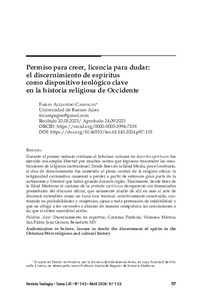Please use this identifier to cite or link to this item:
https://repositorio.uca.edu.ar/handle/123456789/17978| Título: | Permiso para creer, licencia para dudar: el discernimiento de espíritus como dispositivo teológico clave en la historia religiosa de Occidente Authorization to believe, license to doubt: the discernment of spirits in the Christian West religious and cultural history |
Autor: | Campagne, Fabián Alejandro | Palabras clave: | Benedicto XIV, Papa, 1675-1758; CARISMAS; PROFECIA; VISION; MISTICA; San Pablo; Gerson, Jean, 1363-1429; Pablo de Tarso, Santo, m. ca. 67 | Fecha de publicación: | 2024 | Editorial: | Pontificia Universidad Católica Argentina. Facultad de Teología | Cita: | Campagne, F. A. Permiso para creer, licencia para dudar: el discernimiento de espíritus como dispositivo teológico clave en la historia religiosa de Occidente [en línea]. Teología. 2024, 61 (143). doi: 10.46553/teo.61.143.2024.p97-133. Disponible en: https://repositorio.uca.edu.ar/handle/123456789/17978 | Resumen: | Resumen:
Durante el primer milenio cristiano el fabuloso carisma de discretio spirituum fue
ejercido con amplia libertad por muchos santos que lograron trascender las constricciones
de la Iglesia institucional. Desde fines de la Edad Media, por el contrario,
el don de discernimiento fue sometido al pleno control de la religión oficial: la
religiosidad carismática comenzó a perder a partir de entonces gran parte de la
autonomía y libertad que había gozado durante siglos. Finalmente, desde fines de
la Edad Moderna el carisma de la probatio spirituum desapareció sin demasiados
preámbulos del discurso oficial, que solamente aludió de allí en más al arte de
discernir entendido como un know how terrenal, colectivamente construido, sustentado
en probabilidades y conjeturas, ajeno a toda pretensión de infalibilidad y
que no obliga a los creyentes a abrazar de manera compulsiva las conclusiones a
las que el orden sacerdotal arriba. Abstract: In Early Christianity the miraculous charisma of discretio spirituum was exercised with great freedom by many holy men and women who managed to avoid the constraints of the institutional Church. From the end of the Middle Ages, on the contrary, the gift of discernment came under the full control of the official religion: charismatic religiosity began to lose from then on much of the autonomy and freedom it had enjoyed for centuries. Finally, from the end of the early modern period, the charisma of probatio spirituum disappeared without too much ado from the official discourse, which from then on only alluded to the art of discernment understood as a collectively constructed human know-how, based on probabilities and conjectures, oblivious to all pretense of infallibility and incapable of forcing believers to compulsively embrace the conclusions reached by ecclesiastical authorities. |
URI: | https://repositorio.uca.edu.ar/handle/123456789/17978 | ISSN: | 2683-7307 (online) 0328-1396 (impreso) |
Disciplina: | TEOLOGIA | DOI: | 10.46553/teo.61.143.2024.p97-133 | Derechos: | Acceso abierto | Fuente: | Teología. Tomo 61, No. 143, 2024 |
| Appears in Collections: | TEO - 2024 Tomo LXI nro. 143 |
Files in This Item:
| File | Description | Size | Format | |
|---|---|---|---|---|
| Permiso-creer-licencia.pdf | 885,67 kB | Adobe PDF |  View/Open |
Page view(s)
31
checked on Apr 27, 2024
Download(s)
3
checked on Apr 27, 2024
Google ScholarTM
Check
Altmetric
Altmetric
This item is licensed under a Creative Commons License

